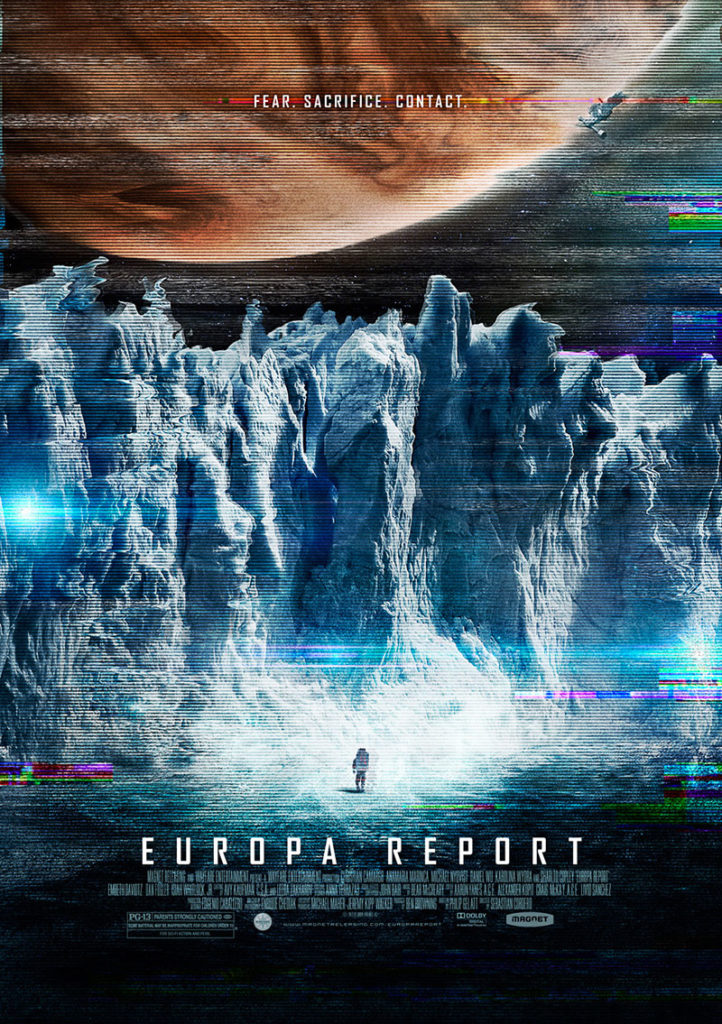Europa Report is a film that exists on the verge of being good. There is certainly a good premise behind the story, but the film falls just short of telling that story effectively.
Europa Report is hard science fiction. By that, I mean the science in it is more science than it is fiction, even though this film does depict space as being able to transmit sound. The film tells the tale (in found footage...oy vey) of the Europa One space mission, a privately funded venture to send a manned crew to the Jovian moon of Europa to find out if there is any life underneath its icy surface. What makes this a hard science fiction story is that, other than Mars, Europa is the best candidate for discovering life outside of our own planet.
If everything went smoothly for the crew of the Europa One, this would be one boring movie. As it is, things do go awry, but it is still a pretty boring movie. For a film that’s an hour and a half long, the story can be boiled down to only four events (spoilers, of course). One: a solar storm knocks out communications with earth. Two: a crew member dies. Three: the crew lands on Europa and another crewmember bites the dust. Four: the remaining crew tries to flee and the film climaxes. In between these events a viewer is forced to spend time with characters who are never fully developed and who we never form attachments to. Instead of there being an exact moment where the film goes wrong, it’s apparent from the very start that Europa Report will never be all that interesting.
But the science is interesting. And so are the politics, for that matter. There isn’t a congressman to be seen anywhere in the film, but that doesn’t mean it’s not about politics.
The Europa One mission is privately funded, and the film states early on that it is the first manned mission since 1972 (the Apollo 17 moon landing) to leave low-earth orbit. It’s extraordinary to think that a private organization could come up with the  funds to launch a mission like this. But it’s not inconceivable. Manned space exploration has been languishing since that last moon landing. Right now, in fact, the United States lacks the capability to put any person in space. It’s unfathomable that the nation that put men on the moon, the highest achievement in the history of human exploration, can’t even send an astronaut to the International Space Station.
funds to launch a mission like this. But it’s not inconceivable. Manned space exploration has been languishing since that last moon landing. Right now, in fact, the United States lacks the capability to put any person in space. It’s unfathomable that the nation that put men on the moon, the highest achievement in the history of human exploration, can’t even send an astronaut to the International Space Station.
There’s an argument to be made that that is not necessarily a bad thing. The space station is in low-earth orbit. Maybe NASA shouldn’t be wasting its time there. Maybe it should be focusing all of its manned efforts on breaking away, once again, from the earth’s gravity.
But a film like Europa Report seems to stem from a perception that NASA has not only ceded low-earth orbit to Russia, China, and private companies like SpaceX and Virgin Galactic, but deep space, as well. This film is an indication of how far NASA has fallen in the public esteem. Right now, NASA is developing the next generation of rockets to carry human beings into space. But, we all know that while NASA has the will to do great things in the name of space exploration, the government does not. The government needs a compelling reason to fund NASA at the levels human exploration requires, and without a boogeyman like the Soviet Union, it does not have that reason. That is why Europa Report depicts a private space venture, and not a government one. It’s also why such a decision on the part of the filmmakers seems so right. A depressing thought, indeed.
